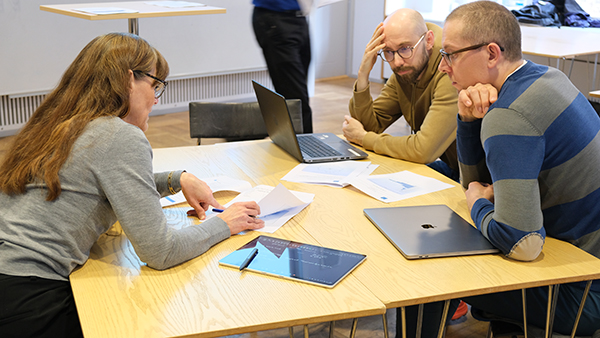Job satisfaction findings for Swedish faculty

The project Academic Profession in the Knowledge Society (APIKS) held a conference in Aveiro, Portugal.
The Swedish APIKS team, Khayala Ismayilova, Anders Broström and Lars Geschwind
from HEOS were there in person to present their paper titled “Predictors of Job Satisfaction in Swedish Academia; Jod Demand Resource Model (JD-R)”
APIKS
The Academic Profession in the Knowledge-Based Society (APIKS) is a study examining changes in the world of academic work in over 30 countries. In general, the study is devoted to the exploration of research and teaching activities, budget of working time, academic achievements, and perception of academic work, working conditions, job satisfaction, and a range of demographic characteristics of university faculty. The results offer the opportunity to examine the changing nature of work at universities and other higher education institutions both nationally and internationally.
APIKS Conference - General work situation and working conditions in academia
Predictors of Job Satisfaction in Swedish Academia; Job Demand Resource Model (JD-R)
In Lars, Anders and Khayala’s presentation - they discussed the typical work environment of faculty as being high pressured and demanding because of forces of internationalization and increasing workload. Previous studies shows that high levels of job demands can evoke stress leading to decreased job satisfaction.Their proposal to the solution is to use the Job Demand Resource Model (J-DR) to investigate the influence of job resources and job demands on faculty job satisfaction.
JD-R
The Job Demands-Resources (JD-R) model is a theoretical framework that tries to integrate two independent research traditions: the stress research tradition and the motivation research tradition. According to the JD-R model, job demands are initiators of a health impairment process and job resources are initiators of a motivational process. In addition, the model specifies how demands and resources interact, and predict important organisational outcomes.
Findings
In the preliminary findings more than half of the university faculty are very highly or highly satisfied with their job in Sweden. As job resources, social support, job security, collegiality, communication, career support and professional development opportunities were found to be predictors of job satisfaction in Swedish academia.
This study contributes to the literature with clear evidence supporting the applicability of the JD-R model among university faculty in Sweden, and the results of this study have implications for improving the university working environment and job satisfaction of university faculty.
